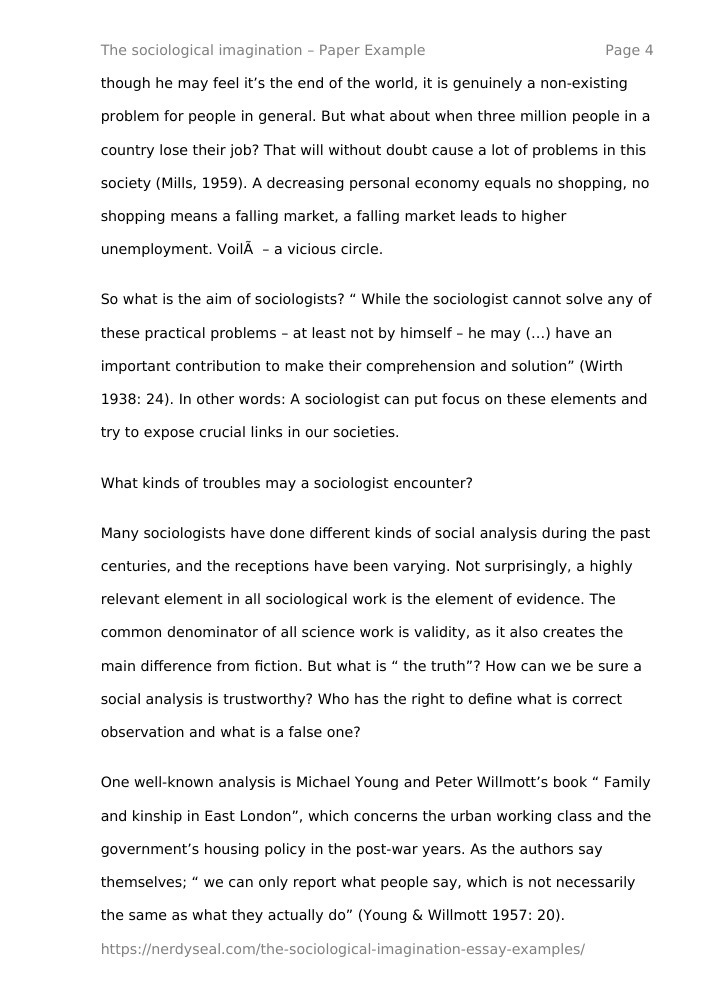Have you ever found yourself wondering why certain social patterns exist, or why we act the way we do? Do you sometimes feel bogged down by the limitations of your everyday life, struggling to grasp the bigger picture? If so, then you’ve likely stumbled upon the profound yet often overlooked power of the sociological imagination. This framework, coined by the brilliant sociologist C. Wright Mills, offers a lens through which we can understand the interplay between personal troubles and public issues, empowering us to see beyond the confines of our individual experiences and embrace the broader social context.

Image: nerdyseal.com
The sociological imagination encourages us to step outside of our own immediate realities and recognize the intricate web of social forces shaping our lives. It helps us see the connections between seemingly individual experiences like unemployment, poverty, or even our choice of clothing, and larger societal issues like economic inequality, social structures, and cultural norms. By applying this perspective, we can gain a deeper understanding of ourselves, our society, and the world around us.
Examples of the Sociological Imagination in Action
Let’s dive into some real-world examples that illustrate how the sociological imagination can transform our understanding of the world:
1. The Individual’s Struggle vs. the Broader Context:
Imagine a young person struggling to find a job. From an individual perspective, they might feel inadequate, lacking skills or qualifications. But through the sociological imagination, we see that this individual’s struggle isn’t isolated. It’s often rooted in broader social and economic trends like technological advancement, globalization, or even discriminatory hiring practices that disproportionately affect certain groups. This broader context sheds light on the systemic challenges that contribute to individual difficulties, prompting us to seek solutions beyond individual efforts.
2. The Power of Social Norms:
Consider the act of choosing an outfit for a job interview. We may assume this decision is purely personal, a reflection of our preferences and style. But the sociological imagination reveals how deeply embedded social norms affect our choices. We subconsciously adopt certain dress codes deemed appropriate for professionalism, influenced by cultural expectations, media portrayals, and even historical precedents. Recognizing these unwritten rules allows us to critically evaluate their impact, challenge outdated norms, and advocate for more inclusive and equitable work environments.

Image: helpfulprofessor.com
3. Uncovering Hidden Biases:
The sociological imagination helps us identify and challenge implicit biases embedded in everyday interactions. For example, the way we perceive someone based on their race, gender, or socioeconomic status might stem from ingrained societal stereotypes. By stepping outside our personal biases, we can begin to question why we react in certain ways, understanding how historical injustices and power dynamics continue to shape our perceptions. This awareness can lead to more conscious and inclusive interactions, fostering empathy and challenging discrimination.
4. The Social Construction of Reality:
Think about our understanding of love, marriage, or even the concept of “family.” These seemingly natural phenomena are actually social constructs, defined and shaped by cultural norms, historical events, and evolving societal values. The sociological imagination helps us recognize that what we perceive as natural or inevitable is actually a product of social processes. This awareness encourages critical thinking and challenges us to question the status quo, recognizing the dynamic nature of social structures and the power we have to influence them.
5. Debunking the “Individualistic” Myth:
Our modern culture often promotes a strong emphasis on individual responsibility and achievement. Yet, the sociological imagination underscores the interconnectedness of our lives and the powerful influence of social forces. From the economic systems that shape our opportunities to the cultural narratives that inform our beliefs and values, we are all products of our collective social fabric. Recognizing this interconnectedness empowers us to move beyond individualistic narratives and embrace a more holistic, collaborative approach to solving social problems.
Embracing the Sociological Imagination: Actionable Steps for Change
By applying the sociological imagination, we can become better citizens and agents of change:
- Challenge the Status Quo: Question what you’re told, explore different perspectives, and engage in critical thinking about the world around you.
- Embrace Empathy: Put yourself in the shoes of others, understanding their experiences and perspectives, even if they differ from your own.
- Become an Informed Citizen: Stay informed about current events, social trends, and research findings that shed light on the complexities of our society.
- Advocate for Change: Use your voice to raise awareness, challenge injustices, and champion policies that promote equity and social justice.
Examples Of The Sociological Imagination
Conclusion
The sociological imagination is a powerful tool for making sense of the world and our place in it. It empowers us to see beyond the confines of our individual experiences and recognize the intricate connections between personal troubles and public issues. By applying this framework, we can challenge the status quo, foster empathy, and become agents of change, working together to create a more just and equitable world. Remember, the sociological imagination invites us to engage with the world, not just as passive observers, but as active participants in the continuous process of shaping society. So, let’s unlock the power of this transformative perspective and embark on a journey of understanding and action.






